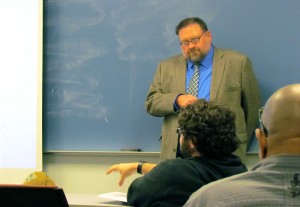

His mother served 23 years in the U.S. Air Force. His father did four years in the U.S. Navy. And his brother toured Iraq with the U.S. Marine Corps.
“I’ve always been interested in warfare and things involving the military,” DeLucia said.
That’s what prompted him to enroll in University of Michigan-Dearborn’s History 390: History of Modern Warfare course, as taught by lecturer Jamie Wraight.
“It’s amazing what people were willing to step up and do in times when they were needed,” said DeLucia, who plans to graduate in April with a bachelor’s degree in political science. “It certainly gives you a greater appreciation.”
Wraight, who is teaching the course for a second time this semester, focuses on the underlying causes of war, like economics and politics. He covers events from the American Revolution to 9/11.
“What I really like about the way Jamie approaches this class is that he looks to bring lots of different perspectives to life for students, so that they’re not just going to hear a lot of the traditional accounts of military service,” said Martin Hershock, dean of UM-Dearborn’s College of Arts, Sciences, and Letters. “They’re also going to get a sober account of what it was like to be there and to be squared off against someone who wants to kill you.”
And to give his students a deeper understanding, Wraight invites veterans into his classroom to discuss their experiences in warfare.
“They can read all the stuff in textbooks, but until you hear it, and you put a name and a face together, I don’t think it hits home for them,” said Wraight, curator of UM-Dearborn’s Voice/Vision Holocaust Survivor Oral History Archive. “I always feel like the best way to teach history is to be able to somehow connect what you’re talking about to make it meaningful to students today. That’s what makes it real.”
The course’s unique structure also doesn’t include a final research paper. Instead, students are required to interview a veteran. Some plan to conduct video interviews, while others will rely on audio recordings.
Wraight hopes to upload the interviews online, so that students can expand upon their academic portfolio.
Stephanie Townsend plans to interview a co-worker who served in the U.S. military.
“It makes it more realistic, instead of just reading about it,” said Townsend, who plans to graduate next year with a bachelor’s degree in history.
DeLucia plans to interview his mother.
“I’m sure there are plenty of stories I haven’t heard from her,” said DeLucia, who recommends the course to others. “If you love history, what’s not to love about this course?”





